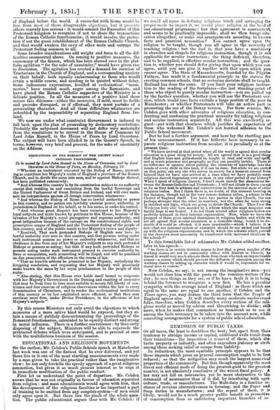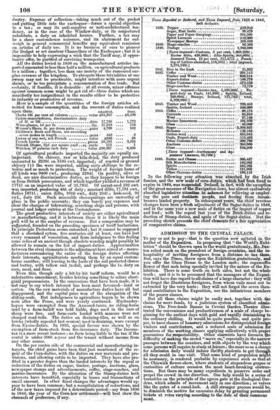REMISSION OF PUBLIC TAXES.
Or all taxes, the least is doubtless the best ; but, apart from their tendency to abridge income or capital, additional evils result from their transitions—the imposition or removal of them, which dii- turbs property or industry, and often engenders jealousy or strife among those seeking relief or escape from liability.
In reductions, the most equitable principle appears to be that those imposts which press on general consumption ought to be first reduced ; so that the mitigation may reach the largest numerical proportion of the community. But this, though apparently the most direct and efficient mode of doing the greatest good to the greatest number, is not absolutely conclusive of the wisest fiscal policy. A tax may not fall on necessaries, yet be more obstructive to the command of necessaries than if it did, by interfering with agri- culture, trade, or manufactures. The Malt-duty is a familiar in- stance of revenue obstructiveness in farming, and the Paper and Soap duties in manufactures ; and the repeal of them, it is likely, would not be a much greater public benefit as promotive of consumption than as unfettering important branches of dristry. Expense of collection—taking much out of the pocket and putting little into the exchequer—forms a special objection to .a tax ; so may its anti-sanative Or anti-architectural ten- dency., as in the case of the Window-duty, or its conjectured substitute, a duty on inhabited houses. Further, a tax may be a sheer customhouse nuisance, and its abatement far out- weigh in general commercial benefits any equivalent remission on ,articles of daily use. It is no business of ours to pioneer ,the- Budget or act amateur Chancellors of the Exchequer ; but it is impossible to help expressing a wish that the Tariff may, if oppor- tunity offer, be purified of surviving trumperies. All the duties levied in 1850 on the manufactured articles im- ported amounted to less than half a million, on. agricultural products to a million ; together, less than one moiety of the rumoured snr- -plus revenue of the kingdom. To abrogate these trivialities at one ;swoop may not be practicable, might interfere with more urgent claims, r be too precipitate a consummation of free trade. But ceitainly, if feasible, it is desirable : :at all events, minor offences against oommon sense might be got rid of—those duties whioh are manifestly too insignificant in the results either to be protective fa industry or productive of revenue. Ilere is a sample of the quantities of the foreign articles ad- mitted for home consumption, and the amount of duties realized upon them. Admitted. Duty.
• Clocks 101. per cent ad valorem value 461,957 .... £6,198 Atton-manufactures, diacrizainative duty .
.. of 51. or 101 ditto 17,790 .... 1,772 Vine-glaaaes, id per lb. lbs. 27,919 116
Women's Shoes, 68. perdozen pairs .. .... pairs 4,769 102 Children's Boots and Shoes, not exceeding
. seven inches in length pairs -442 .... 6 Lawns of any sort, net French value £85¢ • • .. 86
French Lawns pieces 28,195 .. 3,524 Diimisk Diaper, 21. per square yard .. sq. yards 113 .... 1 Witches, 10 guineas each duty value 00,887 .... 8,490
9f agricultural products imported the majority.are equally Un- important. On chicory, raw or kiln-dried, the duty produced amlninted to 3239L on 3105 cwt. imported; of roasted or ground chicory 115 lbs. were imported, adding sixty shillings to the re- ',Au° and so much to protection. The weight of foreign hams of ailhinds was 9460 cwt., producing, 3284/. On Poultry, alive or dead, are nice discriminative duties, as they happen to be foreign or from British possessions, and which together yielded a revenue of 17711. on an imported value of 31,795/. Of carrot-seed 192 cwt. 'WU imported, producing W. of duty; mustard ditto 17,781 cwt., duilei 10711.; onion ditto, 1016 cwt., duty 2541.; leek-seed, 92 cwt., dutv 231. Such miserable eheeseparings are unworthy of place ii the public. accounts ; they can barely pay expenses and clear the charges of tidewaiting, searching ships and persons, with journal and ledger entries at the Customhouse. The great productive interests of seciety are either agricultural or manufacturing, and it is between these it is likely the main ,pull will be at the surplus of revenue. But a compromise may be suggested, founded on the preceding specimen of tariff barbarisms. In principle Protection seems entombed ; but it cannot be supposed that a cherished sytem, .five centuries old at least, can have lost every remnant of veneration, and- freau indulgence to this feeling some relics of an ancient though obsolete worship might possibly be allowed to remain on the list of import-duties. Approximation between the rival claimants is the adjustment here aimed at—manu- facturers surrendering the entire. of the foreign duties affecting their interests, agriculturists meeting them by an equal custom- loose sacrifice; still leaving to the lords of the soil protected cheese and butter, with tallow and trefoil, and perhaps the ls. duty on corn, meal, and flour.
Even this, though only a bit-by-bit tariff reform, would be a substantive amendment, besides leaving something to solace abori- ginal prepossessions. In the concessions that have been Made, it is -not -easy to say which interest has been most favoured—land or cotton. On the raw materials 'of manufacture duties have all but disappeared, and the -capital prize' won of the abrogation of the -aliding-scale. But indulgences to agriculture began to be shown -social after the Peace, and were yearly continued. Husbandry- horses were exempted from the Assessed-taxes no riding-horse used by a farm-bailiff was held liable, dogs used in the care of sheep were free, and farm-carts loaded with manure were not charged road-tolls. The duties on draining-tiles, as well as on bricks (wholly repealed last session) used in draining, were exempt from Excise-duties. In 1835, special favour was shown by the exemption of farm-stock from fire-insurance duty. The Income- tax is a more recent instance ; no farm being liable to the tax-if the rental is under 300/i a-year and the tenant -without income from any other source. On the per contra side of the commercial and manufacturing in- terests, the chief gains have been that just mentioned of the re- peid of the Corn-duties, with the duties on raw materials and pro- -visions, and allowing cattle to be imported. They have also ro- flted in a greater degree than the landed interests by the repeal or reduction of the duties on sugar, timber, postage, auctions, glass, .newspaper stamps and advertisements, coffee, stage-coaches, and nuirine-insurances. By the alteration of the Stamp-duties both interests have benefited, especially in leases and transactions of small amount. In other fiscal changes the advantages would ap- pear to have been common; but a recapitulation of reductions' and of the new taxes imposed for a determinate period—say from 1836 to 1846, the year of the Corn-law settlement—will best show the
channels of preference, if any. ,
Taxes ..1213pealett or Beehiosiii, find Taxes Imposed; fraifrAt836 to 1816, both inclusive. ,I • . Pepper ,t Off,b10
Sugar, East India '-':' :-,47 Paper and Paper-hangings 394,500 Spirit Licences 442;000
Newspaper Stamps p09,090
,
' 1839. Stage-coaches ' 58,308
' 1840. Postage • 1,240,080
" [Taxes impeeed--Customs, 6 per cent., 1,060,2261.;
- ,
Excise ditto, 438,0001.; ditto Spirits, 344.0001.'; Assessed Taxes, 10 per cent, 311,47;1, ,. Frank- ing of Letters abolished„118,66404tuf imposed, 2,274,2401.1
1841. Rice in the husk 21,832 1842. Coffee 201,113 Tiniber and Wood 608;414 Egiort-duties '109,778
Other Customs-duties 419,630
Stage-coaches iI 72,779
[Taxes impored—Income- 5100 ,, Ex- port-duty on Coals, 141,0 /. ; Spirits,and, 240,000f. ; Stamps, Ireland, 121,745/ ; ' total, 5,629,9891.]
1843. Timber and Wood 126,453
Spirits, Ireland . 24°86:M 1844. Coffee 174
Currants
997,40 5116
Wool Marine Insurances 101,950 •
1845. Sugar 2,30495:8,51 Molasses • 129,183
Cotton-wool 682,042 Coals, Export-duty . ,115,483 Other Customs-duties 380,786 Auctions '305,000
Glass. 624,000 [Taxes imposed—Auctioneers' and masers' Licences, 23,720/.]
1846. Butter and Cheese
Ap- 205,427
Silk Manufactures 162,980 OtherwOustoms-duties 199
Tallow' 14% 08 k1:116 In the following year attention was absorbed by the Irish famine, and the new scale of corn-duties, which had been fixed :to expire in 1849, was suspended. Ireland, in fact, with the exception of the' great measure of the Navigation-laws, has almost exclusively absorbed legislative attention in schemes for relieving or employ- ing the poor and destitute people, and freeing froininciun- brances landed property. In subsequent yenta', the chief revenue changes hive been a fresh adjustment of tli& Sugar-duties in 1848, and iti the same yeiir a new scale of duties oitile import of copper and lead ; with the repeal last year of the' IIiielc-duties and re- duction of Stamp-duties, and again of the Sugar-duties. But the preceding sketch presents the chief elements for a fair appreciation of comparative claims.
, .



























 Previous page
Previous page